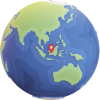Case studies are organised by region, with each region featuring links to the countries where the case studies are located.
Brazil

A legal complaint against the US-based agricultural giant Cargill has been filed following its failure to adequately deal with its participation in soy-driven deforestation and human rights violations in Brazil. Cargill allegedly failed to implement adequate monitoring methods to oversee the vast quantities of soy it trades, handles at its ports, and ships to global markets. This deficiency prevented the company from identifying and eliminating links to deforestation and human rights abuses, thereby breaching its legal due diligence responsibilities. Due diligence deficiencies include a lack of proper environmental due diligence on soy bought from third-party traders, no due diligence on soy owned by other companies passing through its ports and failure to address indirect land use change. The complaint also highlights human rights failures, including forced displacement and violence against land defenders linked to Cargill’s operations, and the destruction of traditional ways of living due to deforestation.
Keywords: Latin America, Brazil, soy, primary production, human rights violations
Sources: https://www.clientearth.org/latest/press-office/press/agricultural-giant-cargill-faces-legal-complaint-over-deforestation-and-human-rights-failings-in-brazil/

Belo Sun Mining Ltd, a Canadian company based in Toronto, has been developing the Volta Grande gold project in Pará State, Brazil since 2012. The project, including a planned open-pit gold mine, is the ancestral home of several Indigenous Peoples and riverine (Ribeirinho) communities. The project has faced numerous legal challenges and complaints. The main issues include inadequate impact studies on the impact to Indigenous Peoples, questionable licensing processes, insufficient consultation with Ribeirinho communities, and potential violations of land rights. Despite these challenges, the project was designated a priority under Brazil's 2021 Pro-Strategic Minerals Policy. Human rights defenders, including Indigenous Peoples, have faced ongoing threats and intimidation related to their opposition to the project. Belo Sun's security firm, Invictus, reportedly intimidated local communities with armed patrols and surveillance. For instance, in October 2023, Belo Sun filed a criminal complaint against 40 individuals accusing them of criminal activities related to land protests.
Keywords: Latin America, Brazil, minerals, gold, primary production, Indigenous rights, human rights violations, land grabbing
Sources: https://srdefenders.org/brazil-threats-intimidation-and-harassment-of-human-rights-defenders-in-the-context-of-the-volta-grande-gold-mining-project-joint-communication/

In Pará, Brazil’s largest palm oil-producing region, violence, land grabbing, and forced evictions of Indigenous, Quilombola, riverine, and campesino communities have been escalating since early 2022. Local leaders allege that government officials have encouraged palm oil producers to suppress any opposition violently. Two major palm oil companies are at the centre of these conflicts. Brasil Biofuels (BBF) is accused of using violence and intimidation against Indigenous and traditional communities. BBF allegedly employs armed security to intimidate and forcibly remove community members from their lands, leading to violent conflicts with the Tembé, Turiuara, and Pitauã Indigenous peoples. Agropalma is linked to fraudulent land grabs, acquiring land with illegal titles, and displacing communities. Despite their denials, both companies are reportedly responsible for severe human rights abuses. Major international brands such Mondelez, Nestlé, PepsiCo, and Unilever continue to source palm oil from BBF and Agropalma, indirectly supporting these human rights violations.
Keywords: Latin America, Brazil, palm oil, primary production, land grabbing, Indigenous rights, human rights violations
Sources: https://www.globalwitness.org/en/campaigns/environmental-activists/amazon-palm/
https://www.globalwitness.org/en/press-releases/brazils-biggest-palm-oil-producers-agropalma-and-brasil-biofuels-human-rights-violations-para-region/

According to Mongabay, a boom in illegal cattle ranching activities in the Arariboia Indigenous Territory in Brazil has caused illegal deforestation and violations of Indigenous rights. An increase in commercial cattle ranching has encroached on large plots of the Arariboia Indigenous Territory. Several bans against such establishments are in place, but cattle ranchers are able to find loopholes since Brazilian laws do not require buffer zones around Indigenous territories, unlike conservation units. Commercial cattle ranching in the area has caused illegal deforestation, as well as other illegal activities such as the construction of an unlicensed airstrip in mid-2023. In addition, the local Indigenous community, the Guajajara, has faced harassment and violence from the illicit loggers. In 2023, four killings and three attempts on their lives were recorded. Killings correlate with areas of illegal activities and police operations against illegal logging. In addition, water contamination and reduced fish stocks due to cattle farming chemicals affect the Guajajara's health and food sources.
Keywords: Latin America, Brazil, cattle, primary production, illegal deforestation, human rights violations, Indigenous rights violations
Sources: https://news.mongabay.com/2024/06/revealed-illegal-cattle-boom-in-arariboia-territory-in-deadliest-year-for-indigenous-guajajara/

According to the U.S. Bureau of International Labour Affairs, there is strong evidence of forced labour, child labour, and other labour violations in cattle raising areas of Brazil and Paraguay, specifically in the Brazilian State of Mato Grosso do Sul and in the Paraguayan Department of Boquerón. Indeed, in Brazil and Paraguay's extensive cattle-raising industries, employers are using coercive recruitment and employment practices. These primarily affect rural and indigenous populations that are falsely promised improved livelihoods. The growing global demand for beef is driving the expansion of cattle operations in these countries, exacerbating the risk of forced labour. In both countries, small and medium cattle producers, supplying to larger international slaughterhouses, often use advance payments to trap workers in debt bondage. Workers face coercion, threats, and restrictions on their freedom, with employers commonly retaining their identification documents. The remote locations of cattle ranches and workers' reliance on employers for food and housing further contribute to conditions that facilitate forced labour.
Keywords: Latin America, Brazil, cattle, primary production, forced labour, child labour, human rights violations, modern slavery
Sources: https://www.dol.gov/agencies/ilab/project-increase-worker-voice-and-address-forced-labor-child-labor-and-other-labor#:~:text=Employers%20in%20Brazil%20and%20Paraguay's,the%20promise%20of%20better%20livelihoods
Cameroon

According to Mongabay, an investigation by the Earthworm Foundation into the Belgian company Socfin's oil palm plantations in Cameroon and Sierra Leone has confirmed several human rights abuses, including sexual violence and land conflicts. The investigation revealed that in Cameroon, the Socfin Agricultural Company (SAC) was found lacking in due diligence and safeguards. This has resulted in pollution in rivers, lakes, and lagoons near the company's activities, affecting local water sources that communities depend on. There were also instances where the company failed to implement measures proposed in environmental assessments to mitigate air pollution, impacting the health and environment of nearby communities. The investigators also noted widespread issues of sexual harassment and gender-based violence at the plantation. In addition, there are ongoing disputes over land and lease agreements. Issues with the implementation of concession agreements and compensation schemes were identified, showing that promises made to local communities have not been fully honoured. In response to such human rights violence and pollution, recommendations for strengthening reporting mechanisms were made. Some progress has been observed with a land mapping exercise, yet scepticism persists about Socfin's accountability and effectiveness in implementing changes.
Keywords: Sub-Saharan Africa, Cameroon, palm oil, primary production, human rights violations, land grabbing
Sources: https://news.mongabay.com/2024/06/investigation-confirms-more-abuses-on-nigeria-sierra-leone-socfin-plantations/
Democratic Republic of the Congo

The Democratic Republic of Congo (DRC), a leading cobalt supplier, is grappling with environmental and human rights issues due to industrial cobalt mining. A report by RAID and AFREWATCH reveals that toxic pollution from cobalt mining in and around Kolwezi, the heart of DRC’s cobalt industry, is devastating the lives of hundreds of thousands of Congolese people. The report challenges the narrative of ‘clean’ and ‘sustainable cobalt’ promoted by multinational mining companies. It highlights the impacts of water pollution, including health issues among local residents and destructive consequences on local ecosystems and agriculture. The report underscores the urgent need for sustainable practices and effective regulations to protect the DRC’s communities and environment and calls for companies buying cobalt to ensure responsible sourcing.
Keywords: Sub-Saharan Africa, Democratic Republic of Congo (DRC), minerals, cobalt, primary production, human rights violations
Source: New report exposes the environmental and human costs of DRC’s cobalt boom - RAID (raid-uk.org)
Guatemala

A Guatemalan palm oil company, linked to an oil spill into Guatemala's Pasion River and to numerous human rights abuses, has been charged with corruption and fraud. According to Friends of the Earth, Reforestadora de Palma S.A. (RESPA) was involved in an immense fish kill along the Pasión River in 2015 due to pollution from their processing plant, affecting 12,000 people. The company was charged with "ecocide" but the ruling was not enforced after the murder of a key plaintiff, Indigenous leader Rigoberto Lima Choc. Subsequent investigation revealed REPSA’s involvement in several illegal activities such as corporate corruption and environmental mismanagement. Such issues are systemic in Guatemala, where corruption is high, with REPSA being amongst nine companies other charged with influence peddling and bribery. Four high-level executives, including directors Hugo and Juan Milton Molina Botrán, face arrest orders. In addition, REPSA is also allegedly involved in several human rights abuses, rampant in Guatemala’s palm oil sector. Despite the devastating impact of this scandal, the Rainforest Action Network reported in 2021 that Cargill and Nestlé had quietly resumed sourcing palm oil from REPSA. These commercial ties were suspended following the 2018 arrest of REPSA executives, but have since resumed.
Keywords: Latin America, Guatemala, palm oil, primary production, corruption and bribery, human rights violations
Sources: https://www.ran.org/press-releases/cargill-nestle-resumed-palm-oil-sourcing-in-guatemala-despite-legacy-of-violence-and-intimidation-advocates-find/
Honduras

According to Amnesty International, after Honduran President Xiomara Castro took office in January 2022, he promised to protect national parks and end open-pit mining. However, two years later, communities in Tocoa, living in protected areas of northern Honduras, face increased harassment and violence while defending local rivers crucial for their survival. The report explains that the conflict began in 2012 when the Honduran Congress declared the area a national park, aiming to shield it from heavy industries. However, in 2013, Congress reduced the park’s core area, allowing mining permits to be granted. The establishment and operation of iron mines in the area without proper environmental impact assessments has caused pollution in the Guapinol and San Pedro rivers, negatively affecting the local community's water supply. Local communities, claiming they were neither informed nor consulted about these concessions, organised resistance efforts, which were met with brutal repression. In 2019, a violent eviction of a protest camp led to the arrest of many community members. The failure of authorities to adequately investigate the attacks and murders related to this repression reflects systemic neglect and corruption within the country’s governmental systems. The community’s calls for justice have been widely ignored by authorities, with investigations stalled and no arrests made.
Keywords: Latin America, Honduras, minerals, mining, iron, procurement of permit, human rights violations
Sources: https://www.amnesty.org/es/latest/news/2024/01/activists-harassment-killings-protect-rivers-honduras/
Malaysia

An investigation by the Associated Press revealed that human rights abuses, including slavery and rape, as well as child labour are prevalent in Malaysia’s palm oil industry. The investigation documents widespread labour abuses, including forced labour, debt bondage, child labour and sexual harassment. Workers live in poor conditions and work long hours for minimal pay. Human rights violations also include physical violence and lack of medical care. In the face of such abuses, workers are unable to escape their situation of exploitation since they are hired on a day-to-day basis by subcontractors, and their passports are confiscated. In addition, women face sexual harassment and rape, with some cases involving minors. The Associated Press documents the case of a 16-year-old girl who was raped by her boss and threatened with an axe. Women perform the most difficult jobs, working in hazardous conditions and carrying heavy loads. This can cause long-term health issues, including collapsed wombs and miscarriages, that are left untreated. Major Western banks, financial institutions and brands have been linked to these abusive supply chains.
Keywords: South East Asia & Pacific, Malaysia, palm oil, primary production, human rights violations, labour rights violations
Sources: https://www.aljazeera.com/news/2020/11/18/rape-abuses-in-palm-oil-fields-linked-to-top-cosmetic-brands-ap
https://globalnews.ca/news/7355279/palm-oil-forced-labour-top-brands-banks/


The Environmental Crimes Financial Toolkit is developed by WWF and Themis, with support from the Climate Solutions Partnership (CSP). The CSP is a philanthropic collaboration between HSBC, WRI and WWF, with a global network of local partners, aiming at scaling up innovative nature-based solutions, and supporting the transition of the energy sector to renewables in Asia, by combining our resources, knowledge, and insight.


